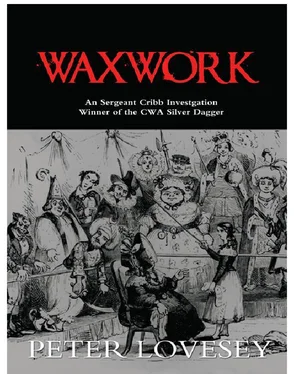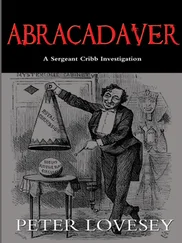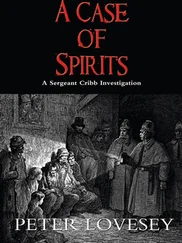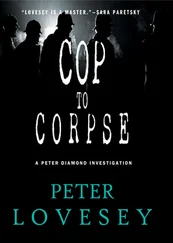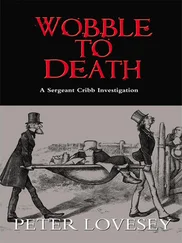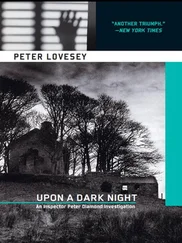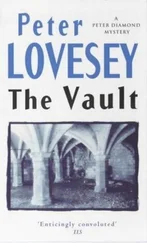Peter Lovesey - Waxwork
Здесь есть возможность читать онлайн «Peter Lovesey - Waxwork» весь текст электронной книги совершенно бесплатно (целиком полную версию без сокращений). В некоторых случаях можно слушать аудио, скачать через торрент в формате fb2 и присутствует краткое содержание. Жанр: Исторический детектив, на английском языке. Описание произведения, (предисловие) а так же отзывы посетителей доступны на портале библиотеки ЛибКат.
- Название:Waxwork
- Автор:
- Жанр:
- Год:неизвестен
- ISBN:нет данных
- Рейтинг книги:3 / 5. Голосов: 1
-
Избранное:Добавить в избранное
- Отзывы:
-
Ваша оценка:
- 60
- 1
- 2
- 3
- 4
- 5
Waxwork: краткое содержание, описание и аннотация
Предлагаем к чтению аннотацию, описание, краткое содержание или предисловие (зависит от того, что написал сам автор книги «Waxwork»). Если вы не нашли необходимую информацию о книге — напишите в комментариях, мы постараемся отыскать её.
Waxwork — читать онлайн бесплатно полную книгу (весь текст) целиком
Ниже представлен текст книги, разбитый по страницам. Система сохранения места последней прочитанной страницы, позволяет с удобством читать онлайн бесплатно книгу «Waxwork», без необходимости каждый раз заново искать на чём Вы остановились. Поставьте закладку, и сможете в любой момент перейти на страницу, на которой закончили чтение.
Интервал:
Закладка:
‘If that is intended as a personal challenge, my man, you may wish to be informed that I have drawn audiences in excess of a hundred to temperance meetings in localities as benighted as Bow and Bethnal Green. Don’t underestimate Dorothea Davenant.’
‘On the contrary,’ said Cribb. ‘I was reliably informed that the Society existed entirely through your inspiration and unflagging enterprise, ma’am.’
For a second she rested her hands on the child’s head and smiled. ‘One tries to occupy oneself usefully, Sergeant.’
‘Highgate should be grateful.’
‘Not only Highgate,’ said Mrs Davenant. ‘Hampstead, Finchley, Muswell Hill and Crouch End. My membership list was a testimony to the Society’s reputation in North London.’
Seizing the chance he had been fencing for, Cribb asked, ‘Do you by any chance still have that list, ma’am?’
‘Destroyed,’ said Mrs Davenant firmly. ‘When the Society came to an end, I put everything to the flame, correspondence, accounts, reports of meetings, everything. I was extremely provoked, as you may imagine. Certain people had taken it upon themselves to make a personal attack on my management. They accused me of self-aggrandisement, Sergeant! I thought that was so despicable that I resigned my position and told them to manage the Society exactly as they wished. Of course it ceased to function. Highgate was deprived of culture by the vitriolic remarks of a clique of jealous incompetents. Headmaster!’ she called over the child’s head. ‘There appears to be something here. Have the doctor look at it, will you?’
‘That’s sad,’ said Cribb, ‘that a fine society like that should disappear overnight. Memories apart, there’s nothing to prove that it ever existed?’
‘Not a thing.’
Someone gave a slight cough at Cribb’s elbow. It was the headmaster, small, pale and white-haired. ‘Pardon me, Mrs Davenant, but I couldn’t help overhearing what you said. If this gentleman is looking for proof of the Society’s existence, I have it in my study. If you recall, I was a loyal attender for three years. When we made our little pilgrimage to Hampstead to look at the seat at the end of Well Walk where poor John Keats was accustomed to rest before he died, we all formed up for a photograph prior to our picnic and poetry recitation-do you remember? Well, I purchased a copy as a memento of the afternoon I discovered the romantic poets. Their verse has sustained me through my attacks of melancholia ever since. If this picture is of any interest, sir-’
‘I should like to see it,’ said Cribb. ‘Would you excuse me, ma’am?’
‘Please yourself,’ said Mrs Davenant, seizing another head. ‘I have more vital things to attend to than photographs.’
The picture hung in a centre position on the wall facing the headmaster’s desk. It showed about thirty people in summer clothes, some standing, others seated, against a background of elm trees. The definition was moderately good, good enough, anyway, for Mrs Davenant to be recognisable in a hat the size of a parasol. Others in the party, in particular those in full sunlight, were less easy to distinguish. Closely as Cribb peered, he could not discover anyone he would swear was Miriam Cromer.
‘These people on the left didn’t come out so well,’ he said. ‘You wouldn’t remember who they were, I suppose, sir?’
‘I am afraid not. This was taken six years ago, in the summer of 1882,’ said the headmaster. ‘Unhappily it has faded, being in a position that catches the sun. Candidly, I doubt whether I should know their names if the faces were clearer. The membership of the Society could not be described as stable. Mrs Davenant was indefatigable in her efforts to recruit, but many lasted as members for only a week. The programme of lectures was perhaps too narrow for certain tastes. No, most of these people are strangers to me.’
Cribb was trying not to feel persecuted. To have found the photograph and still be unable to identify the people in it was damnably frustrating. ‘It just occurs to me,’ he said before admitting defeat, ‘that in group portraits the names are sometimes written on the reverse, to assist identification. I wonder whether-’
‘There’s nothing on the reverse of this,’ said the headmaster. ‘Look.’ He lifted the frame off its hook and turned it for Cribb to examine. It was lined with plain brown paper.
Cribb took out a pocket knife. ‘You don’t mind, sir?’ Before the headmaster could answer there was a neat incision round three sides of the paper. Cribb folded it back and removed the backing of thin wood. ‘How about that, then?’
The picnickers were listed on the back of the mount in fine copperplate and Cribb’s eye had picked out the name Miss M. Kilpatrick immediately. She was one of the group on the left blanched by sunlight. He turned the photograph and made out two female figures seated on a log and another standing near them. In front, two males in blazers and straw hats reclined on the ground. Their names, apart from Miriam’s, were Miss J. Honeycutt, Miss C. Piper, Mr G. Swinson and Mr S. Allingham.
His mind reeling with the implications, Cribb asked, ‘Do you remember any of these people now we have their names, sir?’
‘Absolutely not,’ the headmaster answered in a tone that left no doubt of his displeasure at the mutilation of his picture.
‘Then perhaps you keep a copy of Kelly’s? I shall not damage one page of it, you have my word.’
The school copy of the Post Office Directory of London was five years old but it would do for Cribb’s purpose. He turned up Hampstead and began running his thumb down the street-list. He was looking for the name of Honeycutt. It was less common than Piper and should be easy to spot. If there was a Honeycutt in Hampstead, the chance was high that he would have found the address of one of Miriam’s friends. He saw it on the fifth page. James Honeycutt was an umbrella maker of Flask Walk.
Cribb muttered his thanks, jammed on his bowler, went out into the High Street and gave a piercing whistle. This contingency merited a cab. As it bowled across the Heath he sat well back, ignoring the scene. He was deciding how to broach the subject of indecent photographs with Miss J. Honeycutt.
Flask Walk was on the left at the lower end of Hampstead High Street. Cribb paid the cabby and marched up the middle of the narrow street looking for the umbrella shop. He reached the end without finding it. Cursing his luck, he went into a bookshop to inquire. Honeycutt’s, he learned, had closed down three years ago. The premises were now occupied by an ironmongers. He crossed the Walk to see if the present owner could tell him the whereabouts of the family.
‘The Honeycutts? Couldn’t say, sir. There was only the old man left, wasn’t there? He wasn’t up to carrying on the business after his daughter went.’
‘She went, you say? Where did she go?’
‘To meet her Maker. She died, sir. Suicide, it was. She took poison. A tragedy. She was only twenty-one, and a fine-looking lass, too.’
‘When did this happen?’
‘It must have been three or four months before the old man sold up his business. Yes, I would say it was August or September, 1884. It was all reported in the Express at the time.’
It was from the file of the Hampstead and Highgate Express in their office at Holly Mount that Cribb obtained a fuller account of Judith Honeycutt’s death:
THE HAMPSTEAD POISONING TRAGEDY
Mr Adolphus, the North London Coroner, held an inquest on Monday last at the Civic Hall touching on the death of Judith May Honeycutt, aged twenty-one years, a spinster lately residing at Flask Walk, Hampstead, who was found dead on 31st August in the studio of Mr Julian Ducane, photographer, of West End Lane, West Hampstead. Mr Ducane deposed that the deceased had been in his employment as a retoucher and receptionist since March. On the Friday in question he had left her working in the studio while he went to Swiss Cottage to collect some materials. Upon his return at about a quarter to five o’clock, Mr Ducane discovered the deceased lying dead beside the desk where she had been working. From the attitude of the body, he suspected she had taken poison. A teacup was found beside the body.
Читать дальшеИнтервал:
Закладка:
Похожие книги на «Waxwork»
Представляем Вашему вниманию похожие книги на «Waxwork» списком для выбора. Мы отобрали схожую по названию и смыслу литературу в надежде предоставить читателям больше вариантов отыскать новые, интересные, ещё непрочитанные произведения.
Обсуждение, отзывы о книге «Waxwork» и просто собственные мнения читателей. Оставьте ваши комментарии, напишите, что Вы думаете о произведении, его смысле или главных героях. Укажите что конкретно понравилось, а что нет, и почему Вы так считаете.
